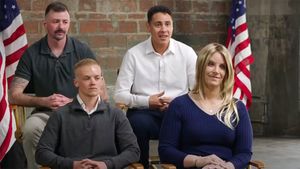Despite medical advancements coming a long way compared to decades past, there is still no cure for HIV and AIDS. But even though the journey has been long (and ongoing) there are still folks out there like activist Jeffrey Drew, a man living with HIV who underwent an experimental medical trial in an effort to find a cure, who are using every opportunity they can to keep making sure research doesn't stop.
His story is being told in the eye-opening new documentary Right to Try, which was directed by filmmaker Zeberiah Newman and picked up and produced by Oscar-winning screen legend Octavia Spencer.
Out got the chance to chat with Spencer about what drew her to Right to Try, why she wanted to produce the doc for a wide audience, her optimism for the future of medical treatments for HIV and AIDS, and more.
Out: Can you just take us behind the genesis of your involvement with Right to Try? How did you learn about the documentary and what made you want to sign on as a producer? What was it about Jeffrey's story that made you want to share that with the world?
Octavia Spencer: Marc Malkin had written an amazing story about it in Variety. I got with my team over at my company, Brian Clisham, Stephanie Kluft, and we all agreed that we needed to see it. It was such a compelling article, and intriguing, and we just thought, 'Well, I want to see this.' When we saw it, we loved it, but we felt like it needed a little work and changing the narrative so that it was a little more cohesive. We talked to Zeb Newman and we couldn't believe how receptive he was to our notes and making sure that the narrative had a certain flow to it, and he agreed. So we got to work doing a re-edit on it, and we were able to get Katy Perry to give us a song for it.
What you see now is our involvement, although Zeb and Jeffrey had done a lot of great work and had a bunch of beautiful scenes. We just thought we could help streamline that narrative for them and for the world. We think it's important for the world to see because we have one man who decided that it was time to find a cure. I think so many people are living with HIV and AIDS and people have forgotten those that we've lost. I think the number is something like a person gets infected every 15 minutes. So it's just time that we further advance the treatment and/or cure. Jeffrey wasn't paid to be a part of this study. The only thing that he gained from it was the outcome. It took him a long time to get there because he was sick throughout. It changed his whole immune system. So it was pretty touching, it was a pretty extensive thing that he did.
The documentary exposes a lot of hard eye-opening truths about the chokehold big pharma has in regards to currently available HIV treatments and medication. In producing this documentary, did you learn anything new about that world or about that business or how big pharma worked, especially with HIV and AIDS?
What we know is that we, the people of this country, all need to fight. The fact that our medicine in other countries is far less than in other countries... It seems that pharmaceutical companies use medicine as a preventative. Here it feels like it's medicine as a business, and we're suffering as citizens. There are so many people who can't afford their meds, so the fact that Jeffrey participated in this trial with four other people and is the only one to complete the experiment. Others dropped out very early on. They weren't getting any money. The meds were making them sick.
This subject matter about big pharma really upsets me because I'm from a working-class family. HIV is now a chronic illness and the meds cost one person $50,000 a year. The average person doesn't even earn that. You see the math there. If your meds cost you $50,000 a year and you earn $32,000 a year, how much is your insurance covering? How much is your insurance not covering? Diabetes is another chronic illness where people are rationing their medication. So even though this documentary is about the fact that Jeffrey could be the very first person cured of AIDS, the bigger conversation is what we have to do about big pharma. They've made all the money they need to make at this point. Gazillions of dollars. Let's treat the American people fairly. Let's give people access to their drugs and meds so that they too can live their life in dignity and not have to worry about whether or not they're going to pay rent or get their medicine.
One of my favorite parts about the documentary is when a doctor mentioned something about how there are more people living with HIV and AIDS than ever before, but because it's now more manageable, it doesn't make the front page news anymore. Do you have any theories as to why that is? And do you hope documentaries like this open up discussions that HIV and AIDS are still around and we still need to be talking about it?
It's proliferating in the South with Black women. I have a lot of theories about it, because it's a business now. Instead of curing people, it's really and truly about making money. It's a lucrative business. It's a lucrative business to have so many people living with the disease that need hundreds of thousand of dollars worth of medication each year. You do the math. If there are so many people now living with HIV and AIDS, and the cost of medication is $50,000 a person, it is a lucrative business to just manage the medicine. I'm sorry, but there's no way that the cost for the medicine, as long as they've been doing it, needs to be that high.
In the documentary, Jeffrey has an incredible sense of optimism that the medical trials he's going through are going to be worth it and help future generations. Did you like that brighter, positive aspect of the doc?
Well, Jeffrey has every right to be optimistic because he's been living with HIV for 33 years. The fact that he has such a positive outlook makes me happy, and he's right. I think as a person who has lived with it for so long, he wants something different for the kids of the future, for people in the future. He wants them to be able to not have to be worried or afraid about their health. To also be optimistic about every other aspect of their lives. And that's who Jeffrey is. He's an optimistic person. That's one of the reasons why he's so beloved.
HIV and AIDS used to be an incredibly taboo topic of discussion, and because of that, people were fine with letting almost an entire generation of folks, who were mostly queer, mostly people of color, die out. Can you reflect on being able to openly produce an important documentary like this and have it be available on a mainstream platform like Peacock?
I do remember I was 10 years old when AIDS first came about, and I remember all of the fervor around it and the fear surrounding it. I think we've evolved to a certain extent with regard to taboo subjects, and medicine should not ever be taboo. Advancement in medications and medicine should never be taboo, especially if it saves lives, but until it started to cross over into mainstream life, it wasn't talked about. So I think it's important that stories like this get told. I think it's important that people like Jeffrey exist because it is a reminder that if we didn't have the advancement in medication, if we didn't have the advancement in technology, if we didn't have these people who were so brave to tell their story and to live openly and free, we don't really know where we'd be with the drug manufacturing. Would they have continued to put it at the forefront, even?
I'm glad that a lot of people are living with HIV and AIDS; now it's time to find the cure. If we can make it undetectable in people's systems, then let's go to the next steps. Let's figure out what we need to do to cure AIDS, because it affects people all around the world.
Are you optimistic that a cure will be found soon, in our lifetime?
I think so. I think what's really, really remarkable, and thank God for it, is they're using some of the technology that they learned from HIV and AIDS research to help with the coronavirus and the mRNA vaccines. They're using that information to help with other diseases. I think that's so remarkable. So if they can do that, yes, they will continue and can continue to fight to cure AIDS. I do.
I just remember so many people, I was a kid, so I didn't know any of them, but I just felt for their families because it seems that so many were dying, and they were so young and they were dying so quickly. I was afraid and I was sad, and I just hoped that they would cure it because they were curing everything else. My little brain at that time didn't understand the science or anything behind it. I just knew that something had to be done, and to now be even a small part of Jeffrey's journey lets me know that we still have more to do.
There used to be benefits. I remember when Elizabeth Taylor did benefits. I got to wonder how do we start that up again, you know what I'm saying? Because there are people that are still living with it. There are people that are still suffering in some way. I think we need to continue to move forward, to advance, and we need more people like Jeffrey. He's one of a kind.
Right to Try is now streaming on Peacock.
RELATED | Billy Porter Reveals He Is Living With HIV in New Cover Story









































































